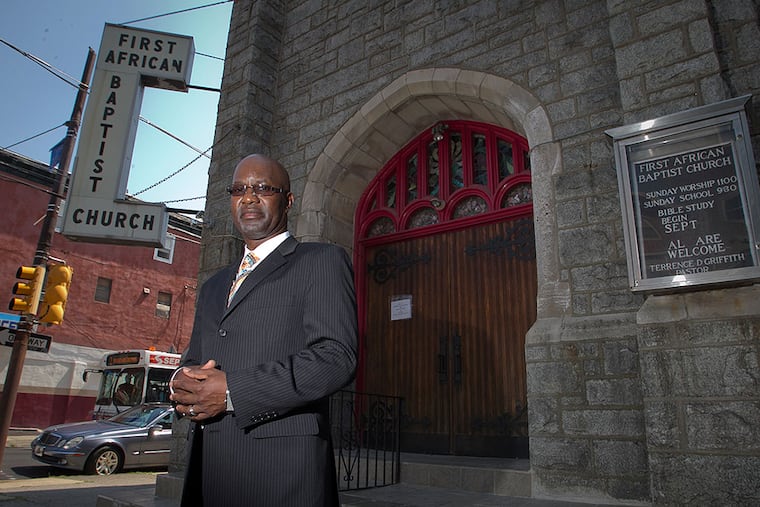Over pastor's objections, First African Baptist added to city's historic register

The Philadelphia Historical Commission voted on Friday morning to add First African Baptist Church to the local register of historic places.
Immediately after the vote, the church's pastor, Terrence Griffith, who also heads the Black Clergy of Philadelphia and Vicinity, vowed to use all his political influence to push for changes at the Commission — both its membership and its policies. Griffith, who opposed historic designation and wants to sell the building to developers, said it's unfair that anyone can nominate a building for historic protection, with or without the owner's consent.
"I'm going to commit myself to overhauling this commission," Griffith told PlanPhilly. "You can bet your bottom dollar on that. This commission will be overhauled."
Griffith and his lawyers had initially tried to get a continuance of the Historical Commission hearing. The church has been declared unsafe by the Department of Licenses & Inspections, and property violations will be the subject of a hearing before the Court of Common Pleas later this month. The church leadership wanted the commission to hold off on its vote until after that hearing takes place.
Oscar Beisert, a private citizen who submitted the nomination for historic protection, said the condition of the church has nothing to do with its historical merit. The commission agreed and rejected the request for a continuance.
The church, at the corner of 16th and Christian streets, was built in 1906, designed by the architecture firm Watson & Huckel. The congregation, which occupied a handful of buildings prior to its current one, was started in 1809 and is the oldest African American Baptist congregation in the city.
Pastor Griffith said on Friday that the choice was whether to save the church or save the congregation. He said the church has already spent too much money repairing the old building and can't afford to keep investing in it in the future. The building, he said, had become "a millstone around the necks of the congregation."
Griffith also said that the nomination of the church was undertaken by Beisert without any "genuine interest" in the church community and without any offer of money to help restore the building.
Over the last few months, Griffith has been tangling with a small group of his congregants who oppose his development plan, and who have filed a lawsuit against the church for what they claim was an illegal change to the church's bylaws. That group, represented by attorney Robert Vance, contends that the church has ways of raising the money it needs to restore the building, but that it just isn't interested in doing so. Oscar Hankinson, a former congregant who initiated the lawsuit against First African Baptist, said that the church could sell an adjacent house that it owns and get more than enough money to fix up the building.
"This building is historical," said Prudence Harvey, a church member. "It is our heritage as black Americans and the heritage of all Americans."
"I believe we're making history today," she added later. " ... I don't think there is another group in the United States that is working this hard to tear down their own history."
Last month, the commission's committee on historic designation recommended that the commission accept the nomination. The full commission was similarly persuaded.
"There is no question in my mind that this building meets the criteria," said Commissioner Robert Thomas.
The commission voted unanimously to designate the church, with Commissioner John Mattioni abstaining.
"The pastor runs the church," said Hankinson, one of the former congregants who opposes the development plan, after the hearing. "He has a group that's following him hook, line, and sinker."
Sharif Street, one of the lawyers representing Griffith, repeatedly emphasized that the sale of the church was opposed by only a small handful of former congregants. Griffith said the historic designation could upset the congregation's attempt to sell the building and find a new home. The congregation has its eye on a number of potential new properties, but Griffith declined to say where.
PlanPhilly is a project of WHYY/NewsWorks, covering design, development, and planning in Philadelphia. PlanPhilly was founded in 2006 as a project of PennPraxis at the University of Pennsylvania School of Design. Click here to join PlanPhilly's community.